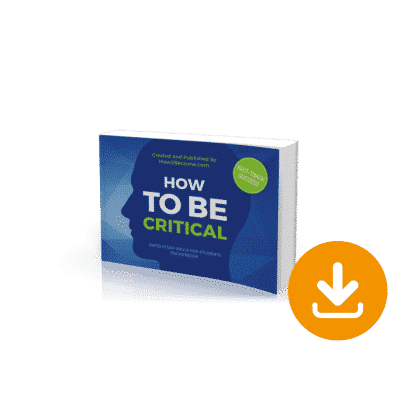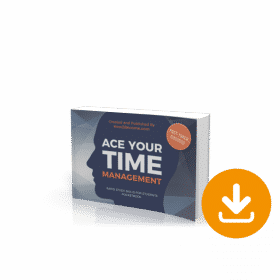HOW TO BE CRITICAL
How To Be Critical is the ultimate guide to becoming a better critical thinker and writer. Critical thinking skills are vital for a number of different university courses, as well as numerous careers. This guide will give you the tools, techniques, and advice needed to improve your critical eye and make you more proficient in critical thinking, critical reading, and critical writing.
WHAT IS CRITICAL THINKING?
Critical thinking is the art of examining ideas and arguments, picking them apart, and figuring out how they work. It’s a skill which allows individuals to discuss and carefully consider their beliefs and the arguments made by others, figuring out what’s true and what’s false.
When partaking in critical thinking, you’re concerned with the structure of arguments, and whether they follow agreed-upon conventions. If an argument follows these rules, then it’s usually considered to be a strong argument. However, if an argument sounds suspicious, imprecise, or poorly supported, then you’ll need to figure out why and identify it. This is the role of the critical thinker both during debates and everyday life.
WHY SHOULD I CARE ABOUT CRITICAL THINKING?
Critical thinking is vital in so many aspects of life. For example, students studying essay-based subjects such as English Literature, History, Philosophy, Theology, Politics, or Economics as part of a school or university course will need to be able to think, read, and write critically, rather than descriptively. To get the highest marks in these subjects, a critical eye is invaluable.
Likewise, many employers love to see a critical thinker in candidates because it shows that they can approach their job with attention to detail, a keen eye for mistakes and possible improvements, as well as the capability to provide solutions to problems that others might not have even noticed. For this reason, critical thinking is excellent for jobs in a number of fields, particularly in graduate jobs.

HOW CAN THIS GUIDE HELP?
As you can see, being a critical thinker can be incredibly beneficial as a student or as a graduate looking for your dream job. This guide contains the tools, techniques, tips, and advice needed to improve your skills in critical thinking, critical reading, and critical writing. You’ll learn:
- What critical thinking is, and why it’s important;
- How arguments are structured;
- The conventions and rules which make some arguments better than others;
- The main argumentative techniques you’ll come across as a critical thinker;
- Top tips for how to use your critical thinking skills to form a critical argument.
These are all essential skills for becoming a truly accomplished critical thinker, and this guide will guide you through all of them in a portable, pocket-sized format!
SAMPLE INFORMAL FALLACIES
Appeal to False Authority
Appeal to false authority is similar to a regular appeal to authority, but the ‘authority’ being relied on is dubious or unreliable. For example, if someone cited a lawyer who had been disbarred in their argument, this could be considered a false authority.
This can also occur when individuals whose expertise is irrelevant to an argument is cited. For example, if someone cites their favourite musician as an authority when it comes to why you should vote for a specific political party, then this is an appeal to false authority. While this musician might be incredibly talented in their own field, their endorsement of a political party doesn’t serve as a strong argument on its own.
Appeal to Emotion
Appeals to emotion are attempts to evoke an emotional response from the opponent or the audience, rather than give evidence for their argument. Take note that it’s completely acceptable for an argument to evoke emotion – this is unavoidable in more controversial issues – but the argument cannot rely on emotion in order to convince the audience or undermine the opponent.
The following is an example of an appeal to emotion:
‘I find it disgusting that there are still people living rough in the UK, don’t you?’
The aim of the above question is to put the opponent in a difficult position. If they agree, then they might be compromising their own argument. However, if they disagree, they might come across as callous or even cruel. In a debate with an audience, this could be used to sway the audience in the speaker’s favour, rather than convince them using reason.
This is a fallacy of relevance because the emotions of the speaker, opponent and audience are not a valid replacement for evidence and reasoning. The emotional response of any of these parties is irrelevant.
Appeals to emotion are usually easy to identify. If the argument includes an overwhelming amount of emotive language, or questions the emotional status of the audience or opponent, then it might be trying to appeal to emotions rather than make a strong argument.
Appeal to Nature
The appeal to nature is a particularly common fallacy employed when discussing what is right or wrong. An appeal to nature is made when the speaker assumes that something that is natural is necessarily good, correct, or moral. Conversely, the same fallacy is made if one assumes that something that is unnatural is bad, incorrect, or immoral.
Here’s an example of an appeal to nature:
‘Genetically-modified crops could be a risk to people’s health – all those chemicals and modified DNA must be harmful.’
This argument assumes that, because genetically modified crops aren’t natural, they must be a threat to people’s health. However, there are plenty of things which could be considered natural that are bad.
For example, the venom from a poisonous snake is natural, and it’s also natural for the snake to bite prey or potential predators. However, we wouldn’t say that it’s good to be bitten by a snake, or it’s good that the snake injects venomous poison into its victims. We might not say it’s bad or wrong either, but either way the status of it being natural has no impact on whether we think that it’s good, correct, or moral.
This argument is sometimes portrayed as ‘playing god’, especially when it comes to ethical issues such as genetic modification and embryonic screening.
SAMPLE TIPS – CRITICAL WRITING
Keep Track of Key Terms
In many subjects, terminology is vital for a proper understanding. When thinking, reading, and writing critically, it’s important that you know all of the key terms in play. A poor understanding of a phrase could lead to you completely misconstruing an argument, which in turn could completely ruin your criticism of it. When doing your initial reading for an essay, make a note of all the specialist terms that the writer uses, and get clear definitions for all of them. For those which have a vague meaning, keep note of this: you might be able to use that as part of your argument.
Once you have these terms written down with definitions, keep them in an easy-to-read location whenever you’re doing reading or writing for the essay. That way, you can compare definitions between writers and thinkers. This will make it easier to “translate” the ideas of two different pieces of work, especially when lots of different terms are being used.
Be Precise
Precision is vital when writing critically. Make sure to focus on minute details if necessary, picking apart arguments to tell if they’re valid or not. A close eye will allow you to spot issues in arguments that others have written, meaning that you have more to discuss when constructing your own argument.
By precision, we mean that you need to keep an eye on the details of an argument, rather than the vague strokes of it. This means you might have to do the following:
- Read the same page, paragraph, or sentence repeatedly until you fully understand it!
- Read companion pieces and secondary sources in order to get a deeper meaning out of the material;
- Write out entire arguments in your own words, then compare them to other summaries that you find in reputable sources.

✓ 30-Day Money-back Guarantee
Did you know? All orders with How2Become are protected by our 30-day money-back guarantee. What ever the reason…or no reason at all…you can have your money back if this resource isn’t right for you (see our terms for full details).










